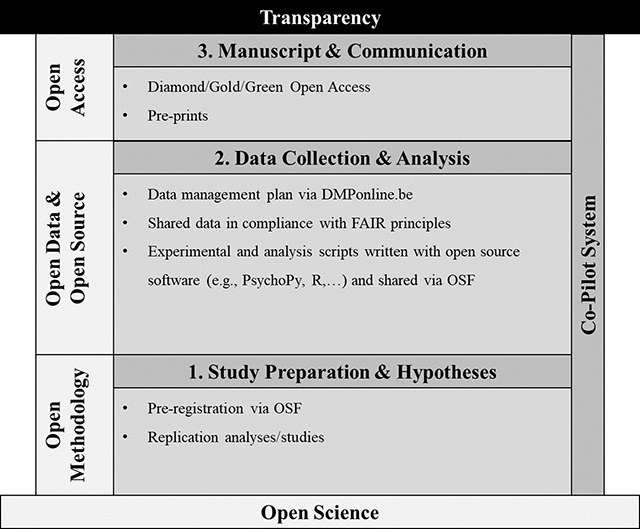The current paper is the mission assertion of the Control of Impulsive Action (Ctrl-ImpAct) Lab concerning Open Science. As early-profession researchers (ECRs) in the lab, we first state our private motivation to conduct analysis based mostly on the ideas of Open Science.
We then describe how we incorporate 4 particular Open Science practices (i.e., Open Methodology, Open Data, Open Source, and Open Access) into our scientific workflow. In extra element, we clarify how Open Science practices are embedded into the so-known as ‘co-pilot’ system in our lab.
The ‘co-pilot’ researcher is concerned in all duties of the ‘pilot’ researcher, that’s designing a research, double-checking experimental and information evaluation scripts, in addition to writing the manuscript.
The lab has arrange this co-pilot system to extend transparency, scale back potential errors that might happen throughout the total workflow, and to accentuate collaborations between lab members. Finally, we talk about potential options for normal issues that might come up when training Open Science.

When Citizens Do Science: Stories from Labs, Garages, and Beyond.
This symposium brings collectively, for the first time, a sequence of private narratives about participation in citizen science and an array of commentaries highlighting the novel moral, societal, scientific, philosophical, and coverage implications these narratives reveal.
This symposium consists of twelve private narratives from people who think about themselves to have engaged in citizen science, starting from particular person self-experimentation to the coordination of large, even worldwide, contributions to well being and environmental analysis. The concern additionally consists of three commentaries on these narratives by specialists in human topic analysis, the philosophy of science, and rhetoric and communication in citizen science.
Given the some ways wherein this sort of work challenges our typical classes of regulation, regulation, ethics, and even the conceptualization of who counts as a “scientist” or what counts as “analysis,” this symposium presents concrete examples that we hope will inform and encourage multidisciplinary dialogue. Not solely will these discussions help citizen science in establishing moral buildings, they’ll undoubtedly additionally supply novel views for reconsidering current buildings.
Recent Advances in Transmission Electron Microscopy for Materials Science at the EMAT Lab of the University of Antwerp.
The fast progress in supplies science that permits the design of supplies all the way down to the nanoscale additionally calls for characterization strategies in a position to analyze the supplies all the way down to the identical scale, equivalent to transmission electron microscopy.
As Belgium’s foremost electron microscopy group, amongst the largest in the world, EMAT is constantly contributing to the growth of TEM strategies, equivalent to excessive-decision imaging, diffraction, electron tomography, and spectroscopies, with an emphasis on quantification and reproducibility, in addition to using TEM methodology at the highest stage to unravel actual-world supplies science issues. The lab’s latest contributions are offered right here along with particular case research so as to spotlight the usefulness of TEM to the development of supplies science.
